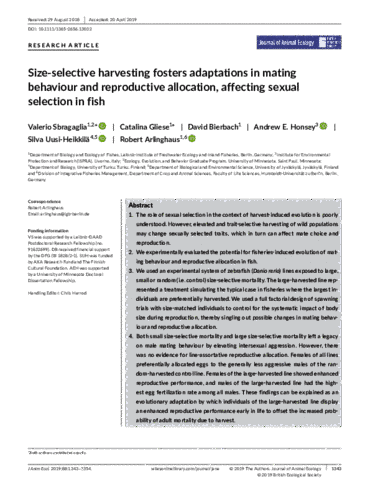1. The role of sexual selection in the context of harvest‐induced evolution is poorly understood. However, elevated and trait‐selective harvesting of wild populations may change sexually selected traits, which in turn can affect mate choice and reproduction.
2. We experimentally evaluated the potential for fisheries‐induced evolution of mating behaviour and reproductive allocation in fish.
3. We used an experimental system of zebrafish (Danio rerio) lines exposed to large, small or random (i.e. control) size‐selective mortality. The large‐harvested line represented a treatment simulating the typical case in fisheries where the largest individuals are preferentially harvested. We used a full factorial design of spawning trials with size‐matched individuals to control for the systematic impact of bodysize during reproduction, thereby singling out possible changes in mating behaviour and reproductive allocation.
4. Both small size‐selective mortality and large size‐selective mortality left a legacy on male mating behaviour by elevating intersexual aggression. However, there was no evidence for line‐assortative reproductive allocation. Females of all lines preferentially allocated eggs to the generally less aggressive males of the random‐harvested control line. Females of the large‐harvested line showed enhanced reproductive performance, and males of the large‐harvested line had the highest egg fertilization rate among all males. These findings can be explained as an evolutionary adaptation by which individuals of the large‐harvested line display an enhanced reproductive performance early in life to offset the increased probability of adult mortality due to harvest.
5. Our results suggest that the large‐harvested line evolved behaviourally mediated reproductive adaptations that could increase the rate of recovery when populations adapted to high fishing pressure come into secondary contact with other populations.

